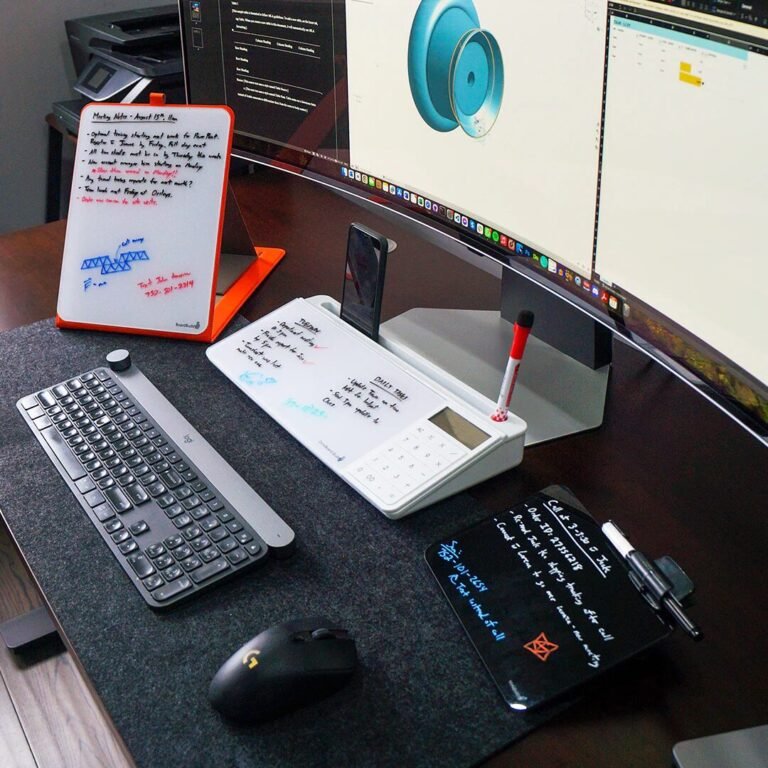Artificial Intelligence isn’t just powering self-driving cars or massive data centers—it’s quietly transforming everyday life. From the way we cook and clean to how we plan our schedules, AI gadgets are making daily routines smoother, smarter, and more efficient. This post explores some of the most useful AI-powered devices available today, how they actually work, and how they can simplify your life in practical ways.
1. Smart Home Assistants: The Everyday Command Centers
AI voice assistants like Amazon Echo (Alexa), Google Nest Hub, and Apple HomePod have become household staples. Beyond answering questions or playing music, these devices serve as centralized control systems for your home.
What they do:
-
Manage smart lights, thermostats, and security systems with voice commands.
-
Create routines—like dimming the lights and locking the doors when you say “Goodnight.”
-
Offer hands-free reminders and calendar updates.
Why it matters:
They streamline multitasking. Whether you’re cooking, working, or relaxing, AI assistants reduce the small mental load of managing your environment.
2. Robot Vacuums and Mops: The Self-Cleaning Helpers
AI-driven cleaning gadgets like the iRobot Roomba j7+, Ecovacs Deebot X2, and Roborock S8 have come a long way. Early versions bumped into furniture endlessly. Modern ones use AI-powered vision and mapping systems to navigate your home intelligently.
What makes them smart:
-
Use machine learning to recognize obstacles like cables or pet waste.
-
Map your home for efficient cleaning routes.
-
Sync with apps to schedule cleanings when you’re away.
Pro tip: For pet owners, choose a model with AI-based dirt detection—it learns high-traffic zones and cleans them more often.
3. AI Wearables: Health Tracking that Actually Learns
Smartwatches and fitness trackers have evolved from step counters to personal health advisors. Devices like the Apple Watch Series 9, Fitbit Sense 2, and Oura Ring use AI to interpret your habits and help you make informed decisions about your health.
AI in action:
-
Detect irregular heart rhythms or stress levels using real-time biometrics.
-
Suggest workouts or rest days based on past behavior.
-
Learn your sleep patterns and offer actionable improvements.
Why it’s helpful:
Instead of overwhelming users with data, AI wearables now provide context and personalized guidance. For example, if your sleep quality drops, the device can correlate it with late-night screen time or caffeine intake.
4. Smart Kitchen Devices: Cooking Made Smarter
Cooking has always been about timing and precision—two things AI handles well. From meal prep to cleanup, AI-enabled kitchen tools can make life easier for both beginners and busy professionals.
Popular examples:
-
Smart ovens like the June Oven use computer vision to identify food and automatically set the right temperature and time.
-
AI coffee makers (like Spinn) learn your taste preferences and brew accordingly.
-
Smart fridges like Samsung’s Family Hub monitor groceries and suggest recipes based on what’s inside.
Everyday impact:
These devices minimize food waste, reduce cooking errors, and help you make healthier choices without spending extra time or effort.
5. AI-Powered Personal Assistants on Your Phone
While physical gadgets are impressive, your smartphone remains the most powerful AI device you already own. Tools like Google Assistant, Siri, and ChatGPT-powered apps extend AI’s reach into communication, productivity, and creativity.
Real-world uses:
-
Summarizing long emails or documents.
-
Drafting quick messages or to-do lists.
-
Translating languages in real time.
-
Suggesting the best routes based on traffic patterns.
Pro tip: Explore AI-based productivity apps like Notion AI or Otter.ai—they can organize meeting notes, summarize recordings, and handle repetitive admin tasks effortlessly.
6. AI Security Devices: Smarter Protection for Your Home
Traditional security systems alert you after something happens. AI-powered ones, like Arlo Pro 5S, Google Nest Cam, and Eufy Security SoloCam, focus on prevention and real-time response.
How AI improves security:
-
Recognizes familiar faces vs. strangers.
-
Filters out false alarms caused by pets or moving trees.
-
Sends instant alerts with video snippets when it detects unusual behavior.
Why it matters:
AI security tools make home monitoring proactive rather than reactive. Instead of constant alerts, you get meaningful notifications that actually require attention.
7. AI Cars and Driving Assist Tools
Even if you don’t own a self-driving car, AI is likely already helping you on the road. Many vehicles today come with AI-based driver-assist systems such as Tesla Autopilot, Ford BlueCruise, or GM Super Cruise.
What they do:
-
Maintain lane positions and safe following distances.
-
Warn or correct drifting behavior.
-
Recognize signs, lights, and pedestrians.
In addition:
Standalone tools like Garmin DriveAssist or AI dash cams learn driving patterns and can even alert you to risky behavior—helpful for both personal use and fleet management.
8. AI in Daily Self-Care and Productivity
Beyond the home and car, AI is also reshaping how we manage stress, focus, and creativity.
Examples:
-
AI meditation apps like Headspace and Calm tailor sessions to your stress levels.
-
AI planners like Motion or Reclaim.ai automatically schedule your work based on productivity peaks.
-
AI journaling tools analyze your entries and reflect mood trends or triggers.
Insight:
These systems learn your routines over time and help you maintain balance—not by adding more to your plate, but by removing mental clutter.
Conclusion: The Future of “Smart” is Subtle
AI gadgets aren’t about turning your home into a sci-fi movie. They’re about quiet efficiency—removing friction from everyday tasks so you can focus on what matters most. As AI becomes more integrated into consumer technology, the smartest devices will feel less like tools and more like intuitive extensions of our routines.
Whether it’s an oven that learns your recipes or a wearable that keeps track of your stress levels, these innovations are reminders that AI isn’t replacing humans—it’s empowering us to live smarter, not harder.




